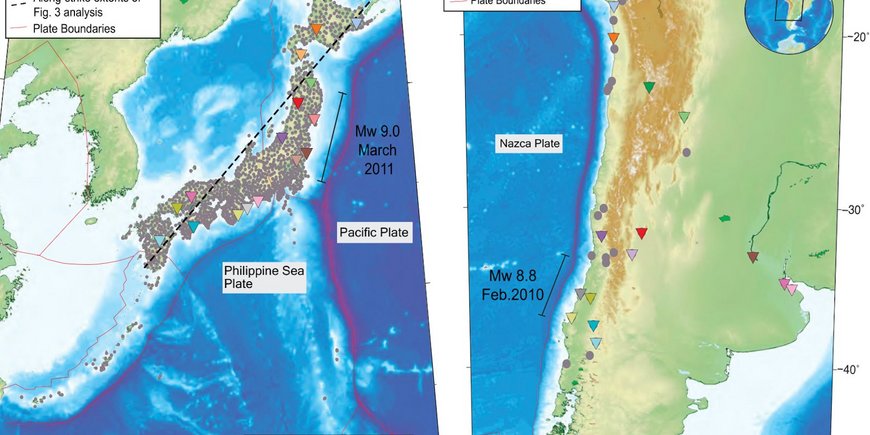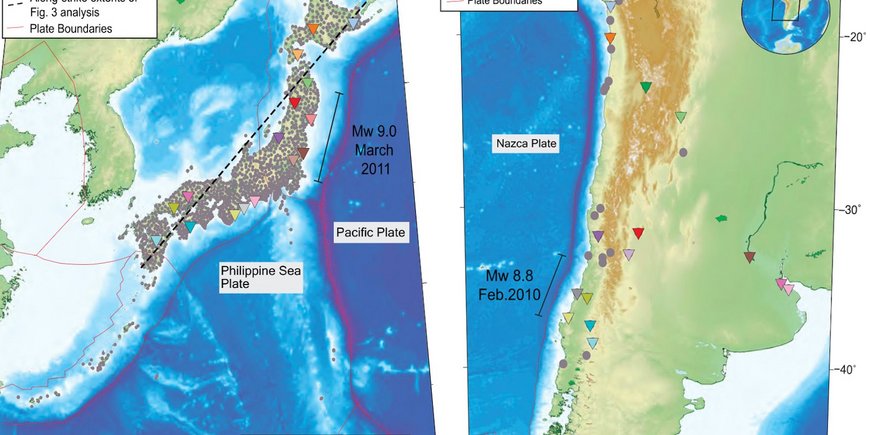Jonathan Bedford, scientist at the GFZ German Research Centre for Geosciences, has received a “Starting Grant” from the European Research Council ERC of nearly two million euros for a project in earthquake research. With this grant, Bedford wants to evaluate the movement of tectonic plates over different timescales to better understand the driving forces, both above- and below- ground. This proposal follows on from recent findings in global navigation satellite systems (GNSS) tectonic research, which show that plates at their boundaries are accelerating on various spatial and temporal scales, and that some of these accelerations seem to be indicative of earthquake imminence.
Bedford will base the bulk of the project „TectoVision“ at the Ruhr University in Bochum, with the GFZ participating as a key partner institution with funding of about 460,000 euros. The researcher works in the section "Dynamics of the Lithosphere" at GFZ and cooperates closely with colleagues from the GFZ’s sections Space Geodetic Techniques, Earth System Modeling, and Global Geomonitoring and Gravity Field.
Among other things, Bedford will use the funding to establish the world's first low-cost tectonic GNSS network with 72 receiving stations to accurately record the movements of microplates in Greece. In the Mediterranean region, there are numerous smaller crustal plates that shift against each other by a few centimeters per year and also undergo rotational and tilting movements. This mosaic, in turn, is in a sense squeezed between the massive African plate in the south and the Eurasian continental plate in the north. This "vice" brings pressure into the system. Together with colleagues in the GFZ's analog lab, where such processes are studied on a laboratory scale, and with researchers from the earth survey sections as well as modeling experts, Bedford wants to decipher the complicated movements - some occur in minutes, some take decades - and their underlying mechanisms.
Background (press release about a related study in Nature from April 2020): Link









![[Translate to English:] Torsten Sachs in front of a climate station on a field](/fileadmin/_processed_/3/9/csm__TorstenSachs_bearbeitet_GS_4a1365ef84.jpeg)

![[Translate to English:] left image flood at the Ahrtal: image from above, several houses are flooded; left image:: Heidi Kreibich;](/fileadmin/_processed_/4/4/csm_Bild2_9af0130e9f.png)



![[Translate to English:] Start der Vega Rakete](/fileadmin/_processed_/6/4/csm_20231201-kachel_Vega-VV23-launch_ESA-CNES-Arianespace_706716b68c.jpeg)









![[Translate to English:] Poster exhibition at the Brandenburg Hydrogen Day at the GFZ, some participants in the foreground](/fileadmin/_processed_/6/5/csm_Erster_Brandenburgischer_Wasserstofftag_GFZ_402fcec95e.jpeg)
![[Translate to English:] Group picture of the participants](/fileadmin/_processed_/9/4/csm_20231108_CAWa-Workshop-Tashkent_Gruppenbild_99ea779d8a.jpeg)

![[Translate to English:] [Translate to English:] Hörsaal](/fileadmin/_processed_/e/6/csm_H%C3%B6rsal_e21ac645fb.jpeg)


![[Translate to English:] The Delegations in the Historic Library on the Telegrafenberg. In the back there are from left to right, the Dutch Ambassador for Germany, Ronald van Roeden, the Dutch Minister for Education, Culture and Science, Robbert Dijkgraaf and the scientific director of the GFZ, Susanne Buiter.](/fileadmin/_processed_/d/b/csm_Kachel-2_9eba4b4212.jpeg)

